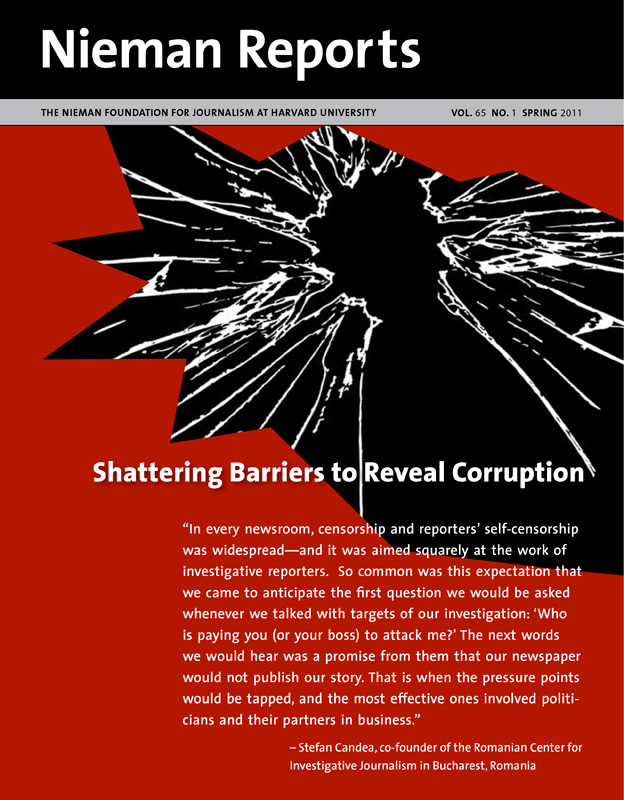
4:12, Feb. 11, 2011, Tahrir Square. Photo by Peter Turnley/Corbis.
In Arabic, corruption looks like this:
 It was a battle cry heard in Cairo's Tahrir Square.
It was a battle cry heard in Cairo's Tahrir Square.Romanians define this pervasive force as coruptie, and reporters encounter it in newsrooms where "local oligarchs—rich businesspeople who are involved in politics and whose primary business interests are not in media—now own and control media," writes independent Romanian journalist Stefan Candea.
In Russia,
 is thought of as the tightly woven fabric of oligarchical wealth and political power. In confronting a web of illicit business interests that extends far beyond the nation's borders, Alexei Navalny and Maxim Trudolyubov write, "Today in Russia journalists need help in their fight against corruption."
is thought of as the tightly woven fabric of oligarchical wealth and political power. In confronting a web of illicit business interests that extends far beyond the nation's borders, Alexei Navalny and Maxim Trudolyubov write, "Today in Russia journalists need help in their fight against corruption."When the Berlin Wall fell in 1989, it signaled the end of Communist domination. Many predicted the emergence of democratic institutions in countries now able to govern themselves. Yet in the intervening decades neither political leadership nor civic institutions—including journalism—have fully lived up to these expectations. Instead, corruption has insinuated itself into government, business and media to a degree that stifles—if not firmly prevents—journalists from exposing illegal dealings. a role they would assume in a functioning democracy.
The barriers to this kind of reporting and how reporters overcome them is the focus of this issue of Nieman Reports. Journalists write about their attempts to report on corruption in countries from the Black Sea region and Eastern Europe to the tip of Africa and into the heart of China, and from the corridor of nations that stretches from Peru to Mexico and into rural United States.
Bulgarians say
 to describe the usual target of investigative journalist Stanimir Vaglenov, who tells of the personal risks reporters face when they take on corruption: "Fail to watch your step and your health might be damaged—or you could lose your life."
to describe the usual target of investigative journalist Stanimir Vaglenov, who tells of the personal risks reporters face when they take on corruption: "Fail to watch your step and your health might be damaged—or you could lose your life."In Hungary, watchdog reporters do uncover korrupció but consequences are rarely meted out to those whose crimes they reveal. The reporters exposing them, however, are "censored, persecuted, sued or fired from their jobs for doing this type of reporting," writes Tamás Bodoky, a freelance investigative journalist based in Budapest.
External support for such efforts is vital. In this issue, journalists in Europe who provide assistance explain their strategic approaches—such as facilitating collaborative cross-border reporting—at a time when concerns are being raised about conventional models of Western training.
Corrupción is how Mexican, Peruvian and Panamanian journalists say it in places where the challenges of reporting about corruption involve not only legal barricades—some of them starting to be overcome—but deadly retribution.
In a rural county in Kentucky, the managing editor of a small-town newspaper carried a gun and stopped sleeping near a window while she and a young reporter investigated the web of corruption involving the powerful local sheriff.



